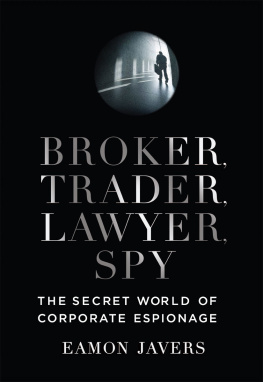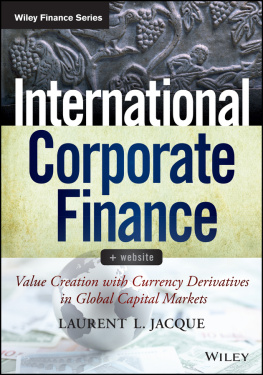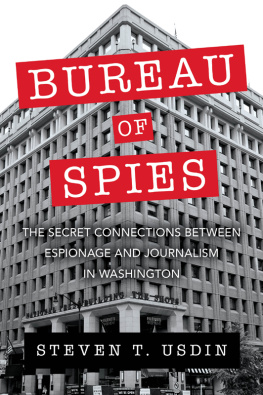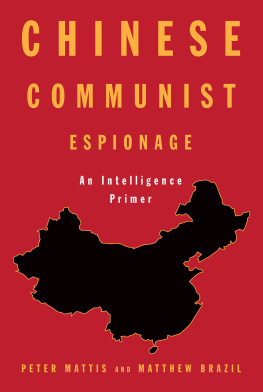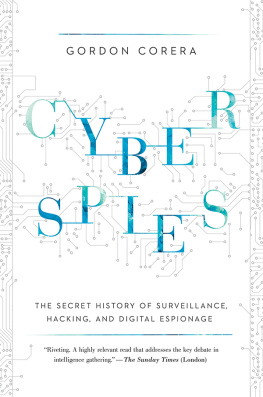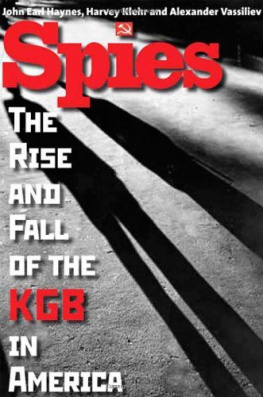For Maureen, who promised me sixty-three years.
The first time I met a spy was in January 2007.
I had been a reporter in Washington, D.C., for more than twelve years by that time, and Id met congressmen, senators, ambassadors, and a president of the United States. I wrote about good guys, meeting with officials from the American Red Cross, police forces, and religious orders. And I wrote about bad guys, visiting a federal prison to interview a convicted embezzler and chatting with the infamous lobbyist Jack Abramoff at his restaurant on Pennsylvania Avenue. I thought Id seen pretty much everything the nations capital had to offer a reporter. But Id never met a spy.
So I was excited as I walked up Connecticut Avenue toward Dupont Circle on that chilly afternoon. I quickened my pace, past Burberry, Brooks Brothers, and the other luxury stores that front the broad avenue. I stepped into the boxy, nondescript corporate office building that held the office of the man I was going to meet: Nick Day.
Day was in his late thirties, only a few years older than I was, but he was already a veteran of the British counterintelligence and security service MI5. He was the CEO of Diligence, LLC, a globe-spanning firm that sold intelligence services to private-sector clients. His cofounder at the firm was a fourteen-year veteran of the CIA. They had connections at the top of British and American business and intelligence, and they worked for some of the richest people in the world.
Id spent nearly five months gathering information on Diligence at that point, and Id been astonished at what Id found. Day and his employees had run a months-long covert undercover operation designed to penetrate the offices of KPMG, the global accounting giant. Theyd done it on behalf of a Washington lobbying firm that was in turn working for a company controlled by one of Russias most powerful oligarchs. And theyd gotten caught.
I didnt know what to expect. Id never been to Langley, so I imagined that a spy headquarters would look something like a cross between the laboratory of James Bonds Q and Batmans cave. But when I arrived on Days floor, I walked into a reception area that looked much more like the offices of a 1990s dot-com company than a Hollywood set. Days receptionist offered me coffee, and soon Nick Day himself came striding out from the back office. He was of medium build, with dark hair and rolled-up shirtsleeves that revealed hairy forearms. He was charming and friendly, and didnt seem the least bit fazed by the mess his company was in. I figured hed seen worse. He led me past a row of analysts hunched over computer screens to an office that was cluttered with brown boxes. It looked as though hed been packing files.
Day gave me a brief on-the-record interview in which he explained his companys role in the world economy. Spies, he said, are sometimes the only people who can solve a companys problems. That was intriguing enough, but I soon learned that Diligence wasnt the only company in the corporate espionage business. There are probably hundreds of firms like it around the world. Corporations, financial institutions, and wealthy individuals can hire intelligence contractors in Britain, America, Europe, Asia, and the Middle East.
In Washington alone, I discovered, potential clients have a wide menu of options to choose from. They can hire firms staffed by ex-FBI agents, ex-CIA officers, or exSecret Service employees. They can hire ex-British MI5 officers like Day at Diligence. Theres even a spy firm made up of ex-Soviet KGB and military intelligence officers. Its located in suburban Virginia, not too far from CIA headquarters, and I had coffee with the owner. We went to Starbucks.
I had stumbled across an entire hidden industry of spies for hire, and I was captivated.
For me, the industry Id found represented a chance to cover something new. This was a heck of a lot more interesting than a congressional hearing, a lobbying fight, or even a corruption scandal. I began calling the spies, to see if theyd talk to me. To my surprise, most of them were happy to open up about their businessif not always on the record. I met with corporate intelligence operatives in Washington, New York, London, and Berlin, many of them veterans of the worlds most elite military forces and intelligence services. I studied the history of the corporate espionage industry and learned that private-sector spying had long been intertwined with the governments own intelligence operations.
The result of that research is this book. In writing it, though, I struggled to answer the most important question about corporate spying: is it right or wrong? To be clear, corporate spying doesnt necessarily involve anything illegal or even unethical. To call people spies simply means that they use intelligence techniques or are veterans of government intelligence services.
The question of right and wrong, though, has haunted private intelligence operatives and their clients since the dawn of the industry in the 1850s. In fact, Allan Pinkerton, the man acknowledged to be the inventor of the private intelligence business, set down the first industry code of conduct in the mid-nineteenth century in order to ensure that such work would remain the high and honorable calling he felt certain it was. Pinkerton outlined basic rules for his agents. They would not work for defendants in criminal cases, and they would not investigate jurors, public officials, or union members. They would not work for a political party against its opposition, they would not work for vice crusaders, and they would work only for flat fees, not for a percentage of the spoils. Moreover, they would never investigate the morals of a woman nor would they handle divorces or other cases of a scandalous nature.
As the 1860s dawned, that was the bright ethical line of the private intelligence industry. But the line didnt hold. Many of Pinkertons modern-day counterparts routinely violate every one of his gentlemanly commandments. The ethical line vanished so quickly, in fact, that Pinkertons own agency became known as one of the best union-busting tools of Americas corporate elite. By then, Pinkertons sons controlled the company he had founded. Sons dont bear the sins of their fathers, its true. But history teaches that sons dont always bear their virtues, either.
As the worlds economies intertwine and different value systems collide, the ethical lines are shifting again. In London, corporate surveillance practitioners grumble about their eastern European competition. The British spieswho tail executives, eavesdrop on conversations, and obtain damaging information about their targetscomplain that the eastern Europeans go too far. One British operative told me that shed never spy on a target while he was with his children. To her, tailing an executive to his sons soccer game feels unseemly. She wont do it. But she acknowledges that there are others who will.
The way things are going in the private spy business worries some intelligence professionals. As one experienced industry operative told me, Were just one scandal away from a government crackdown. He meant that with so much unsavory conduct going on, the industry is bound to explode into public view. The veteran CIA officer John Brennan, a deputy national security adviser in the White House, is another concerned observer. The problem is that you do things in the service of your country that are just not appropriate to do in the private sector, Brennan told me in the months before he was tapped for his White House role by President Barack Obama. I hope theyve brought their ethics with them. At the time, Brennan was between government jobs, and sitting in a bland office at the suburban Virginia company where he worked, which is called The Analysis Corporation. It, too, is a private intelligence firm, although it sells its services to the government, not to the private sector.

